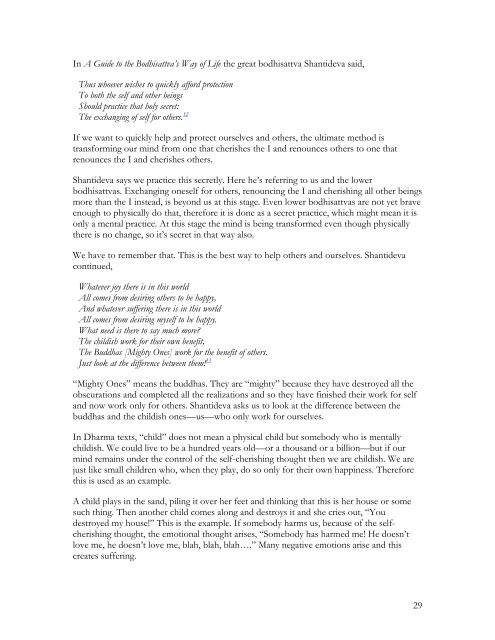Lama Zopa Rinpoche
55OTzl52A
55OTzl52A
You also want an ePaper? Increase the reach of your titles
YUMPU automatically turns print PDFs into web optimized ePapers that Google loves.
In A Guide to the Bodhisattva’s Way of Life the great bodhisattva Shantideva said,<br />
Thus whoever wishes to quickly afford protection<br />
To both the self and other beings<br />
Should practice that holy secret:<br />
The exchanging of self for others. 12<br />
If we want to quickly help and protect ourselves and others, the ultimate method is<br />
transforming our mind from one that cherishes the I and renounces others to one that<br />
renounces the I and cherishes others.<br />
Shantideva says we practice this secretly. Here he’s referring to us and the lower<br />
bodhisattvas. Exchanging oneself for others, renouncing the I and cherishing all other beings<br />
more than the I instead, is beyond us at this stage. Even lower bodhisattvas are not yet brave<br />
enough to physically do that, therefore it is done as a secret practice, which might mean it is<br />
only a mental practice. At this stage the mind is being transformed even though physically<br />
there is no change, so it’s secret in that way also.<br />
We have to remember that. This is the best way to help others and ourselves. Shantideva<br />
continued,<br />
Whatever joy there is in this world<br />
All comes from desiring others to be happy,<br />
And whatever suffering there is in this world<br />
All comes from desiring myself to be happy.<br />
What need is there to say much more?<br />
The childish work for their own benefit,<br />
The Buddhas [Mighty Ones] work for the benefit of others.<br />
Just look at the difference between them! 13<br />
“Mighty Ones” means the buddhas. They are “mighty” because they have destroyed all the<br />
obscurations and completed all the realizations and so they have finished their work for self<br />
and now work only for others. Shantideva asks us to look at the difference between the<br />
buddhas and the childish ones—us—who only work for ourselves.<br />
In Dharma texts, “child” does not mean a physical child but somebody who is mentally<br />
childish. We could live to be a hundred years old—or a thousand or a billion—but if our<br />
mind remains under the control of the self-cherishing thought then we are childish. We are<br />
just like small children who, when they play, do so only for their own happiness. Therefore<br />
this is used as an example.<br />
A child plays in the sand, piling it over her feet and thinking that this is her house or some<br />
such thing. Then another child comes along and destroys it and she cries out, “You<br />
destroyed my house!” This is the example. If somebody harms us, because of the selfcherishing<br />
thought, the emotional thought arises, “Somebody has harmed me! He doesn’t<br />
love me, he doesn’t love me, blah, blah, blah….” Many negative emotions arise and this<br />
creates suffering.<br />
29


